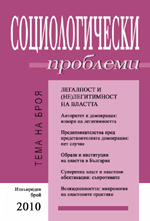Структурни изменения на легитимността
Structural Transformations of Legitimacy
Author(s): Hristo GyoshevSubject(s): Social Sciences
Published by: Институт по философия и социология при БАН
Summary/Abstract: The text traces the changes in the concept of legitimacy in Habermas' discourse theory when this concept is applied to contemporary processes of social-economical globalization. Legitimacy plays a key role for justifying the abstract constitutional patriotism and the „decentered” society in his deliberative democratic model. In the postnational constellation Habermas sees the abstract character of that patriotism as a way of creating solidarity outside national states, but extension of legitimacy conditions, which also presupposes widening of the solidarity sphere, leads not to a more advanced form of the constitutional- patriotic potential to ground solidarity on the rule of law, but to the weakening of that potential. This demonstrates the impossibility to compensate the democratic deficit with a more abstract political identity. The problem that Habermas' supranational project faces is that patriotic solidarity presupposes legitimacy conditions through public autonomy, which are deficient beyond national level. In the cosmopolitan project about human rights, where justification relies entirely on moral-legal arguments, legitimacy undergoes another transformation. Here functional arguments replace the missing political dimension. Although he can not rely on the idea for normative justified law, Habermas argues against his own theoretical credo for an immediate dependence between that law's validity and the emergence of abstract solidarity. This however makes constitutional patriotism an illusory ground for legitimacy for the human rights regime outside democratic society.
Journal: Социологически проблеми
- Issue Year: 42/2010
- Issue No: Spec. 1
- Page Range: 17-37
- Page Count: 21
- Language: Bulgarian
- Content File-PDF

